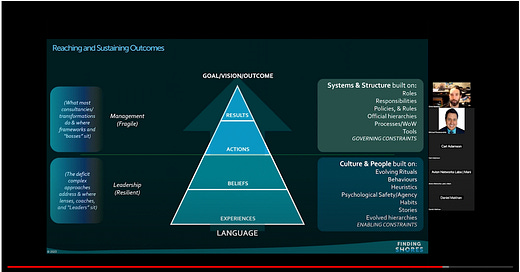A big contradiction of current days, plus Weekly Insight Pills makes a (short) comeback
This is something that has been going through my mind and has been bothering me for a while, in fact… I believe it is one of the biggest contractions we see in business organizations these days. I am definitely neither the only to notice, nor the first to talk about it. It is still worthwhile to keep pointing it out until it becomes more mainstream how can that be deleterious and, more importantly, what can be a better alternative pattern to consider.
This is how I would dare to articulate the contradiction in a diagnostic fashion:
The more you focus on people as the core of your (need for) change, not only the less effective change will be, but also you are not recognizing what matters most for effective change: context and interactions.
For example, if you have been paying any attention to the agile movement, or related things, you might recognize this sort of maxim: it's all about people, it's all about their mindset. The natural implication being that if a change initiative goes wrong, there won't be any uncertainty on what's the scapegoat, who to blame.
"Damn you guys - you just couldn't get to the right mindset!"
You probably can at least imagine how this goes… if not had experienced it yourself - in which case, I am sorry you had to go through such a bull****…
Anyway, enough with the ranting. Let's get to what truly matters here.
Here is the deal - if I may dare again to articulate my diagnosis based on both experience and theoretical study:
Set aside situations of malice, or a genuine mistake, I am yet to find situations in which people actually doing stuff and how they behave is the actual issue of the matter, of why you can't get something to change for the better.
As far as I can tell:
People are genuinely trying to do the right thing (surely more often than not).
People dynamically respond to what happens around them and what they can see or sense, and when we understand what they do we can typically track it back to rational (or at least rationalized) response given the context. That is to say, what they do becomes rather understandable once you understand why (as in the context they were reacting to and interacting with).
As Russell Ackoff defined - "A system is never the sum of its parts, it's the product of their interaction". That effect is amplified in a complex adaptive system (and by definition anything with humans as agents will tend to fit that category). Put in other words, it takes a system to get stuff going and flowing through a business organization, and in the attempt to improve how that works, how effective and efficient that is, there seem to be rather a focus, perhaps an obsession, about how "components" (human agents in this case) should behave and act, and less on the interactions between them - which turns our is what matters most.
And that is exactly where the better alternative pattern should come to rescue. As a summarized maxim of sorts:
Stop obsessing about teams and people's mindset, and start managing (better) flow of work.
A short comeback: Week 04'23 Insight Pills
If you have been following this space, you might have noticed I had not restarted the weekly insight pills series. That has to do with time. At least this time around I could fit something here, because it is in fact a good complementation to the issue.
I came across this worth-the-listening presentation by Christopher Bramley the other day, from the channel "Agile to agility" on YouTube:
https://www.youtube.com/watch?v=Muh9eSef_Wc
At some point, he presents a triangle on reaching and sustaining outcomes. And I thought that was a good way to visualize what ultimately is behind the further deep point of the alternative pattern I have presented above. In the sense that you can only get a sustainable result by not just managing the system of work, but in such a way that is fully embedded into the culture and how things work around an organization.
P.S.: I would agree with Dave Snowden's view of a further deeper issue with the whole obsession about people's mindset and behavior change being the fact that is at best borderline ethical. I just thought that wouldn't add much to the context of the post, while it is truly relevant and an issue in itself.
by Rodrigo Sperb, feel free to connect (I only refuse invites from people clearly with an agenda to ‘coldly’ sell something to me), happy to engage and interact



